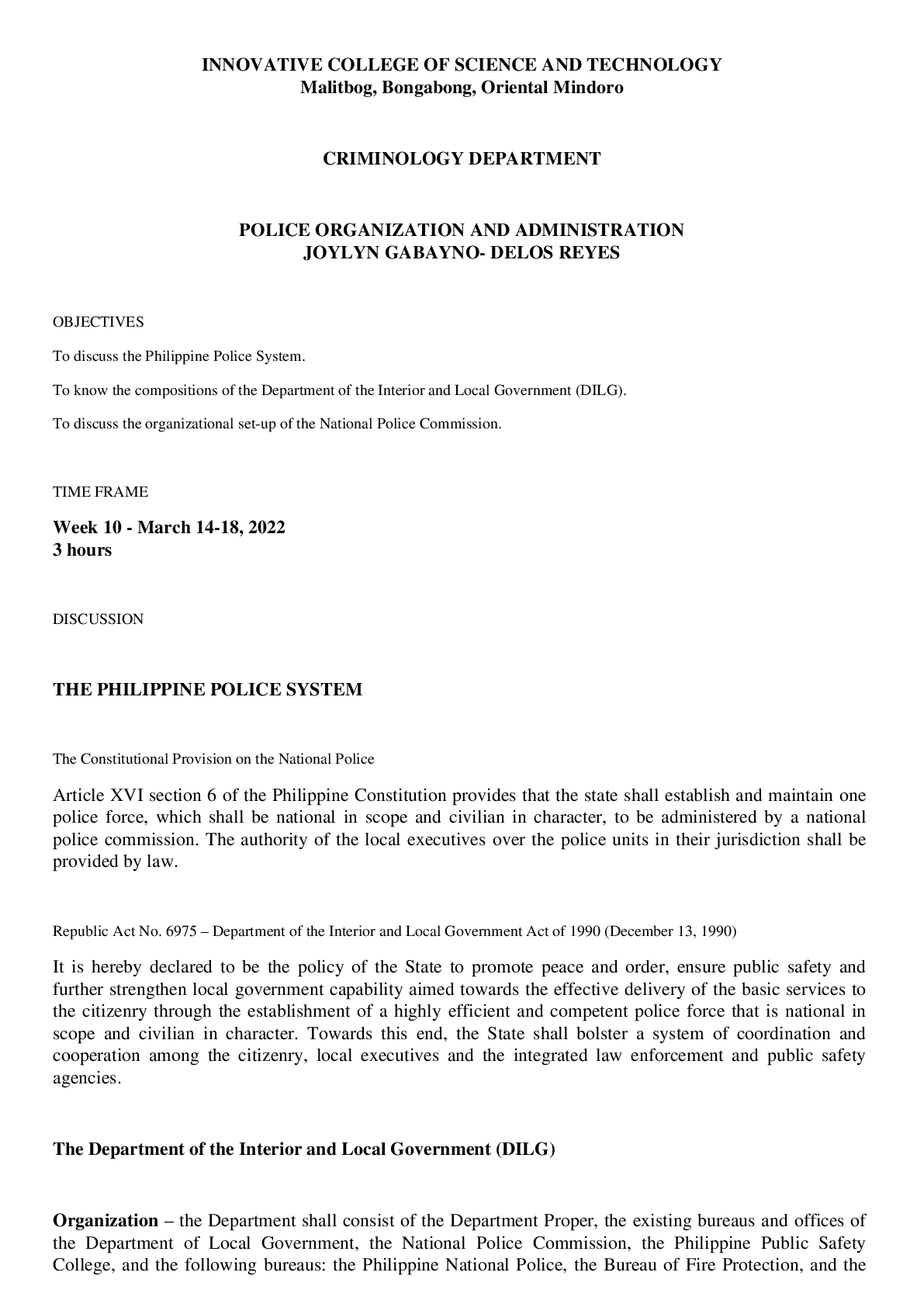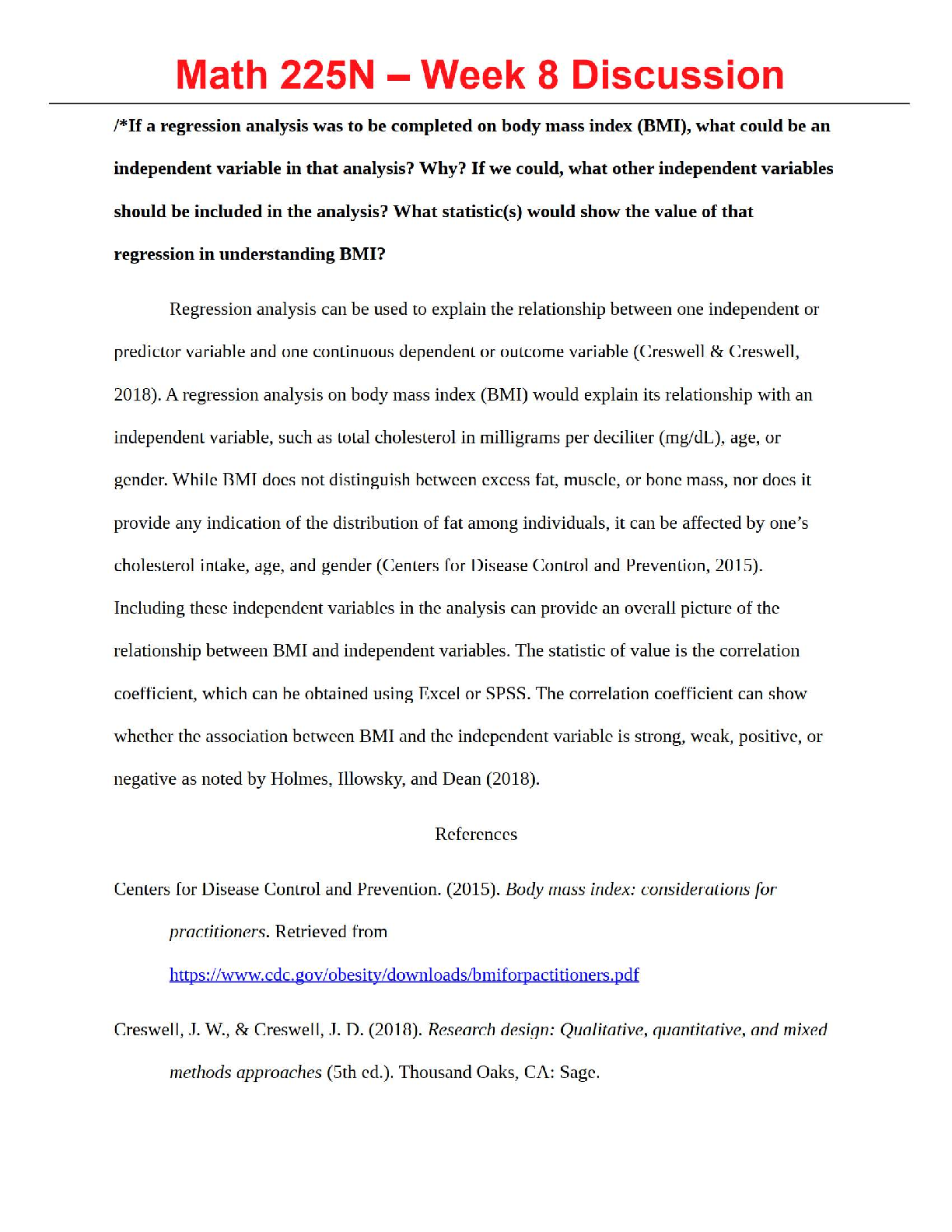1. The Constitutional Provision on the National Police
Article XVI section 6 of the Philippine Constitution provides that the state shall establish and maintain one police force, which shall be national in scope and ci
...
1. The Constitutional Provision on the National Police
Article XVI section 6 of the Philippine Constitution provides that the state shall establish and maintain one police force, which shall be national in scope and civilian in character, to be administered by a national police commission. The authority of the local executives over the police units in their jurisdiction shall be provided by law.
2. Republic Act No. 6975 – Department of the Interior and Local Government Act of 1990 (December 13, 1990)
It is hereby declared to be the policy of the State to promote peace and order, ensure public safety and further strengthen local government capability aimed towards the effective delivery of the basic services to the citizenry through the establishment of a highly efficient and competent police force that is national in scope and civilian in character. Towards this end, the State shall bolster a system of coordination and cooperation among the citizenry, local executives and the integrated law enforcement and public safety agencies.
The Department of the Interior and Local Government (DILG)
Organization – the Department shall consist of the Department Proper, the existing bureaus and offices of the Department of Local Government, the National Police Commission, the Philippine Public Safety College, and the following bureaus: the Philippine National Police, the Bureau of Fire Protection, and the bureau of Jail Management and Penology.
Head of Department – The head of the Department, hereinafter referred to as the Secretary, shall also be the ex-officio Chairman of National Police Commission and shall be appointed by the President subject to confirmation of the Commission on Appointments. No retired or resigned military officer or police official may be appointed as Secretary within one (1) year from the date of his retirement or resignation.
Specific Powers and Functions of the Secretary – In addition to his powers and functions as provided in Executive Order No. 262, the Secretary as department head shall have the following powers and functions:
• Prepare and submit periodic reports, including a Quarterly Anti-Crime Operations Report and such other reports as the President and Congress may require.
• Act as Chairman and Presiding Officer of the National Police Commission; and
• Delegate authority to exercise any substantive or administrative function to the members of the National Police Commission or other officers of rank within the Department.
3. Philippine Public Safety College (PPSC) – is mandated to provide training and education needs to uniformed members of the PNP, BJMP and BFP.
Constitutive Units under the PPSC
a. National Police Training Institute (NPTI) – it consists of the Regional Training Schools for the police in every region in our country. It caters for the training and education of Police Non-commissioned Officers.
b. National Forensic Science Training Institute (NFSTI) – this institute offers technical courses for the police, fire and jail services like Criminal Investigation and Detection Course, Narcotics Investigation Course, Traffic Investigation Course, Dactyloscopy, etc.
c. National Jail Training Institute (NJTI) – it provides training and education for Jail Non-commissioned Officers.
d. National Police College (NPC) – it caters for the education and training for commissioned officers of the police, fire and jail services.
e. National Fire Training Institute (NFTI) – it provides training and education for Fire Non-commissioned Officers.
f. Philippine National Police Academy (PNPA) – it caters for the cadetship program where graduates are conferred the degree Bachelor of Science in public Safety and automatically given the ranks of Inspector.
4. The National Police Commission (NAPOLCOM)
a. Organizational Set-up
The National Police Commission is an agency attached to the DILG for policy and program coordination.
• It is composed of a person, four (4) regular Commissioners, and the Chief of PNP as ex-officio member.
• Three (3) of the regular commissioners shall come from the civilian sector who are neither active nor former members of the police or military, one (1) of whom shall be designated as vice chairperson by the President.
• The fourth regular commissioner shall come from the law enforcement sector either active or retired: Provided, that an active member of a law enforcement agency shall be considered resigned from said agency once appointed to the Commission.
• At least one (10 of the Commissioners shall be a woman.
• The DILG Secretary shall be the ex-officio Chairperson of the Commission.
• The Vice Chairperson shall act as the executive officer of the Commission.
IV. Comprehensive Check-up
1. What do you understand about the Constitutional Provision on the National Police under the Philippine Police System?
2. What are the specific powers and functions of the Secretary of the DILG?
3. What is the organizational set-up of the National Police Commission?
Checked by:
Mrs. Melody Comia- Dimapilis
Department Head
INNOVATIVE COLLEGE OF SCIENCE AND TECHNOLOGY
Malitbog, Bongabong, Oriental Mindoro
CRIMINOLOGY DEPARTMENT
POLICE ORGANIZATION AND ADMINISTRATION
JOYLYN GABAYNO- DELOS REYES
I. OBJECTIVES
1. To understand the powers and functions of the Commission or NAPOLCOM.
2. To show and explain the PNP Organizational Structure.
II. TIME FRAME
Week 11 - March 21-25, 2022
3 hours
III. DISCUSSION
Qualifications of the Regular Commissioners:
a. He or she is a citizen of the Philippines;
b. A member of the Philippine Bar with at least five (5) years’ experience in handling criminal or human rights cases or a holder of a master’s degree but preferably a doctorate degree in public administration, sociology, criminology, criminal justice, law enforcement, and other related disciplines;
c. The regular member coming from the law enforcement sector should have practical experience in law enforcement work for at least five (5) years while the three (3) other regular commissioners must have done extensive research work or projects on law enforcement, criminology or criminal justice or members of a duly registered non-government organization involved in the promotion of peace and order.
Term of Office – The four (4) regular and full-time Commissioners shall be appointed by the president for a term of six (6) years without re-appointment or extension.
Temporary or Permanent Incapacity of the Chairperson – In case of absence due to temporary incapacity of the chairperson, the Vice chair shall serve as Chairperson until the Chairperson is present or regains capacity to serve. In case of death or permanent incapacity or disqualification of the chairperson, the acting chairperson shall also act as such until a new chairperson shall have been appointed by the President and qualified.
Organizational Structure – The Commission shall consist of the following units:
a. Commission Proper – This is composed of the offices of the Chairman and four (4) Commissioners.
b. Staff Services – The staff services of the Commission shall be as follows:
1. The Planning and Research Service
2. The Legal Affairs Service
3. The Crime Prevention and Coordination Service
4. The Personnel and Administrative Service
5. The Inspection, Monitoring and Investigation Service
6. The Installations and Logistics Service
7. The Financial Service
Qualifications of Regional Directors of NAPOLCOM Regional Offices:
a. He or she is a citizen of the Philippines; and
b. A holder of a master’s degree and appropriate civil service eligibility.
Removal from Office – The members of the Commission may be removed from office for cause. All vacancies in the Commission, except through expiration of term, shall be filled up for the unexpired term only: Provided that any person who shall be appointed in this case shall be eligible for regular appointment for another full term.
Prohibitions – The Chairman and members of the Commission shall not engage in the practice of any profession, or intervene, directly or indirectly, in the management and control of any private enterprise. They shall not, directly or indirectly, have any financial or material interest in any transaction requiring the approval of their office.
Powers and Functions of the Commission
a. Exercise administrative control and operational supervision over the Philippine National Police which shall mean the power to:
1. Develop policies and promulgate a police manual prescribing rules and regulations for efficient organization, administration, and operation, including criteria for manpower allocation, distribution and deployment, recruitment, selection, promotion, and retirement of personnel and the conduct of qualifying entrance and promotional examinations for uniformed members;
2. Examine and audit, and thereafter establish the standards for such purposes on a continuing basis, the performance, activities, and facilities of all police agencies throughout the country;
3. Establish a system of uniform crime reporting;
4. Conduct an annual self-report survey and compile statistical data for the accurate assessment of the crime situation and the proper evaluation of the efficiency and effectiveness of all police units in the country;
5. Approve or modify plans and programs on education and training, logistical requirements, communications, records, information systems, crime laboratory, crime prevention and crime reporting;
[Show More]

















